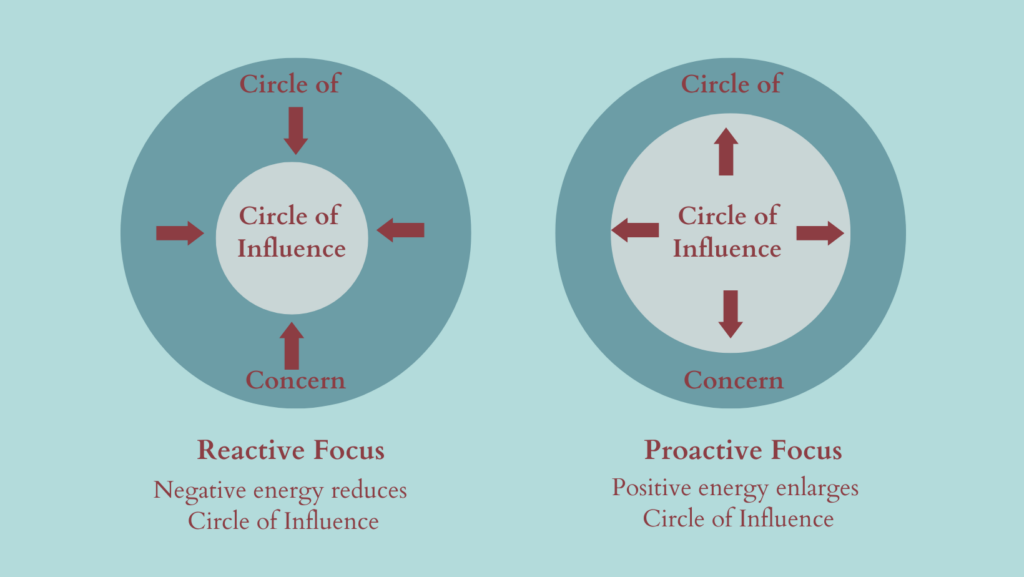Career Transition Series
Habit 1 is the habit of choice, of being proactive, meaning that we are in charge of our lives and can choose our responses and behaviors in response to external events. Losing a job is an unfortunate event for which most of us are unprepared. When someone else steps in and makes decisions that affect our lives, we might experience a loss of control.
“Proactivity means that as human beings, we are responsible for our own lives. Our behavior is a function of our decisions, not our conditions. We have the responsibility to choose our responses. Proactive people do not blame circumstances, conditions, or conditioning for their behavior.” — Stephen R. Covey.
The Circle of Influence is a tool when feeling out of control or overwhelmed. Stephen Covey proposed that the most influential people focus on the things they have some control or influence over. The bigger the Circle of Concern, the more reactive we feel, allowing outside influences to drive our responses.

Focusing on the circle of concern will lead to more stress, depleting your capacity to focus on the things you can control. Here are five common sources of anxiety during a job transition:
FIVE SOURCES OF CONCERN DURING A JOB TRANSITION:
- Experiencing Negative Emotions
Losing a job is challenging, and it takes time to adjust to being unemployed. We might experience an emotional fallout of feeling disoriented and vulnerable. Grief is how we cope with this type of loss. It’s easy to start criticizing or blaming yourself or experiencing anger or betrayal. Fear is a natural response to the uncertainty of unemployment. Focusing on anxiety-producing thoughts leads to a downward spiral making us feel ineffective and stuck.
2. Coping with Uncertainty
We live in a world filled with uncertainty. We cannot be sure about what is going to happen next with the economy, opportunities, and constraints. Uncertainty about how long it will take to find employment may lead to worry, anxiety, and even inability to function. It’s important to explore how it impact us to live with the unknown to better cope with the lack of certainty, focusing on the opportunities rather than the losses.
3. Facing Barriers to Entry the Job Market
Job seekers experience many obstacles to becoming viable candidates for open positions they’re qualified for, such as age and gender biases in employment. Additionally, candidates need help with job search barriers when looking for openings, such as gaps in employment, needing to meet education and training requirements, or the absence of reliable references. Other barriers are needing access to technology, childcare, and transportation for job search.
4. Insecurities
Looking for employment is filled with many sources of anxiety and disappointment that can erode self-confidence and self-esteem. Having to prove someone’s worth, being frequently rejected as a viable candidate, and being ghosted by recruiters and hiring managers are all sources of anxiety that can lead to job search depression, negatively impacting your ability to land a good job when you start lacking confidence in your abilities.
5. Financial Worries
Financial stress is by product of unemployment impacting plans for the future and the resources to supply present needs impacting the entire family unit. Worrying about providing for your loved ones can be a serious stressor.
FROM CONCERNED TO BEING PROACTIVE:
Being proactive about your job search is the first and most important attitude you can have to make things happen for you and rebound through action. While the stress of losing a job can seem overwhelming, there are many things you can do to take control of the situation, maintain your spirits, and find a renewed sense of purpose.
To be proactive, concentrate on the Circle of Influence within your Circle of Concern by focusing on the things you can do something about and choosing your actions, attitudes, and moods. Rebound through action.
Here are five ways to proactively expand your Circle of Influence while reducing your Circle of Concern during a job transition:
- Process your Emotions –
Acknowledging your feelings and challenging your negative thoughts will help you deal with the loss and move on instead of feeling stuck in your circle of concern. Give yourself time to adjust to the loss and acknowledge your feelings, even unpleasant ones. The feelings generated by losing a job are easier to accept if you can find the lesson in your situation. That can be very difficult at such a low point, but ask yourself if you can learn anything from this experience.
2. Focus on What You Can Control
Life is uncertain, and many things are outside of our control. The best way to cope is to Learn to tolerate better, even embrace, the inevitable uncertainty of life. Rather than wasting your precious energy worrying about situations out of your hands, turn your attention to what you can control during your unemployment. Keep a daily routine, creating a job search plan with smart weekly goals. You can also learn new skills, write a great cover letter and resume, and set up meetings with your networking contacts. Practice self-care with good nutrition, exercise, and time outdoors. Socialize and accept help from your support system.
3. Familiarize yourself with Job Search Best Practices.
Making yourself employable might take you to learn how to overcome many barriers and make yourself actively visible for the job market, even if that requires getting out of your comfort zone. Awareness of possible obstacles is essential to identify the support you need to get employed again. Be proactive at explaining employment gaps during your interviews or make your resume ageless. Learn how to customize your resume and cover letters effectively for each application. Boost your LinkedIn profile and learn how to smartly search for job openings and referrals using your network effectively.
4. Concentrate on Your Strengths
Do not take rejection personally. In many instances, seeking a new position is a numbers game, and sometimes the most qualified person is someone other than the one hired but the one that makes more chemistry for the organization. List your strengths and accomplishments. Prepare results statements that reflect your contributions and results. Write down projects you’re proud of, situations where you excelled, and skills you’ve developed. Prepare a branding statement that you can use in your networking conversations, resume, and interviews. List everything you like about yourself, including skills, personality traits, accomplishments, and successes. Revisit this list often to remind yourself of your strengths. Set achievable goals and reward yourself for staying on track with your weekly job search plan.
5. Create a Budget
Financial worries are an expected consequence of losing a job. Regardless of your circumstances, there are ways to ease stress and anxiety and regain control of your finances. The first step is to detail your income, debt, and spending over at least one month. Identify spending habits and look for opportunities to cut unnecessary purchases. Keep your family up to date on your financial situation and how they can help you save money. Give yourself credit for all your steps you are taking to manage your finances in these uncertain times.
Shrink your Circle of Concern by thinking better than your circumstances. Expand your Circle of Influence by taking hands on your situation. By focusing your energy on the things you can control and taking proactive action, you can stop worrying over what you have limited control over. You will feel better and start gaining momentum and progressing on your career transition goals.
Losing a job happens to most people at some time in their careers. Taking charge of the unexpected and rebounding from this career setback will bring you a lot of personal growth.
